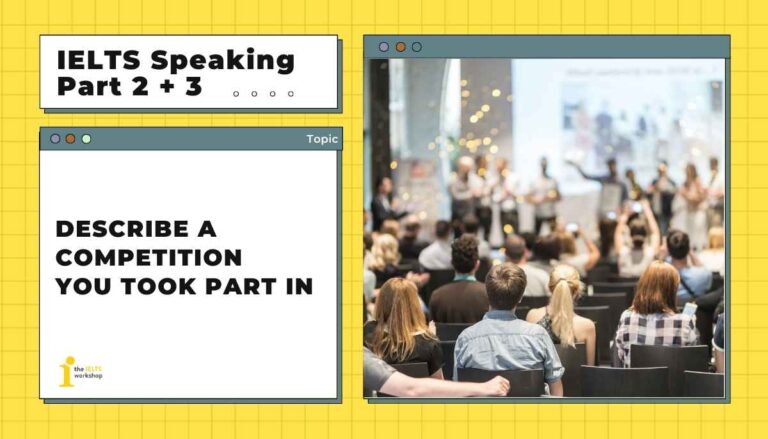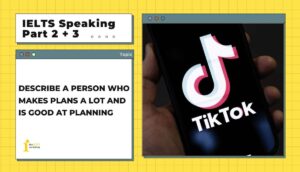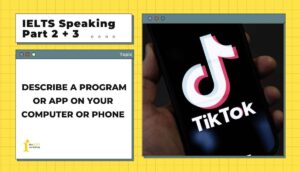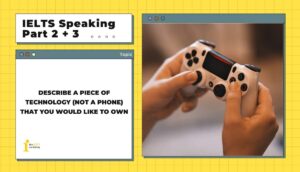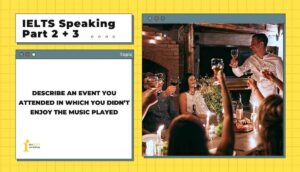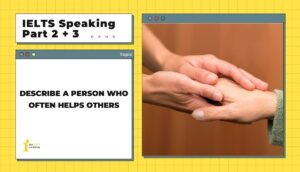Chủ đề Describe a competition you took part in thường xuất hiện trong IELTS Speaking Part 2, yêu cầu người học kể lại trải nghiệm thực tế. Để đạt điểm cao, bạn cần sử dụng ngôn ngữ miêu tả sinh động, chia sẻ cảm xúc cá nhân và nêu bật bài học rút ra từ cuộc thi. Trong bài mẫu dưới đây, cô Trần Minh Anh lựa chọn một cuộc thi hùng biện ở trường – một tình huống quen thuộc nhưng vẫn cho thấy rõ sự tự tin, nỗ lực và tinh thần cạnh tranh lành mạnh.
Part 2: Describe a competition you took part in
You should say:
- What the competition was
- When and where it was held
- What you did in the competition
- And explain what you learned from the competition
1. Bài mẫu (Sample)
One memorable competition I took part in was a public speaking contest organized by my high school when I was in grade 11. It was held in the school auditorium in the spring semester, and students from different grades were encouraged to join.
The contest aimed to improve students’ communication and persuasive skills. Each participant had to prepare a 5-minute speech on a topic of their choice. I chose to speak about the importance of mental health awareness among teenagers, a topic I was deeply passionate about.
To prepare for the competition, I spent hours writing and revising my speech, practicing in front of a mirror, and getting feedback from my English teacher. On the day of the event, I was nervous but also excited. When it was my turn, I walked on stage, took a deep breath, and delivered my speech with as much confidence and emotion as I could muster.
In the end, I won second place, which was a huge achievement for me at the time. But more importantly, I learned how to handle pressure, express my ideas clearly, and believe in myself. The experience also sparked my interest in public speaking, which has helped me immensely in both academic and personal settings since then.
Sample band 8.0 by Tran Minh Anh, IELTS Teacher at The IELTS Workshop
2. Từ vựng (Vocabulary)
- muster (confidence): gom góp (sự tự tin)
- handle pressure: chịu áp lực
- spark interest in: khơi dậy hứng thú với
- express ideas clearly: trình bày ý tưởng rõ ràng
Xem thêm: Giải đề IELTS Writing Task 2: Competition at universities

Part 3:
Competitive people are usually highly motivated, goal-oriented, and resilient. They tend to push themselves to improve and are not easily discouraged by failure. Many also have a strong desire to win or excel in what they do.
- motivated: có động lực
- goal-oriented: có định hướng mục tiêu
- resilient: kiên cường
- discouraged (by failure): nản lòng (vì thất bại)
2. What kinds of contests do students like to take part in?
Students often enjoy academic contests such as spelling bees, math competitions, or debate tournaments. Others may prefer creative contests like art or music competitions. It really depends on their interests and strengths.
- spark interest in: khơi dậy hứng thú với
- express ideas clearly: trình bày ý tưởng rõ ràng
3. Why is it that some people do not want to be competitive?
Some people may find competition stressful or have a fear of being judged. Others might believe in cooperation rather than rivalry. In some cases, past negative experiences can also discourage them from competing again.
- fear of being judged: sợ bị đánh giá
- cooperation: sự hợp tác
- rivalry: sự ganh đua
- discouraged: nản lòng
4. How can a person become more competitive?
One way is to set clear goals and continuously work towards them. It also helps to surround oneself with driven individuals, as this can be motivating. Learning from failures and staying persistent are key to building a competitive mindset.
- surround oneself with (driven individuals): bao quanh mình bởi người có chí tiến thủ
- driven (individual): người có chí tiến thủ
- persistent: kiên trì
5. Do you think parents should encourage their children to take part in competitions?
Yes, but with balance. Competitions can help children muster confidence and develop resilience, but parents should focus on the learning experience rather than just the results. Encouragement should be constructive, not pressuring.
- muster (confidence): gom góp (sự tự tin)
- resilience: sự kiên cường
- constructive encouragement: sự khích lệ mang tính xây dựng
6. What are the advantages of competition?
Competition can drive innovation and self-improvement. It teaches people how to handle pressure, deal with success and failure, and helps them set higher standards for themselves. It also prepares them for real-world challenges where competition is inevitable.
- innovation: sự đổi mới
- self-improvement: sự cải thiện bản thân
- handle pressure: chịu áp lực
- real-world challenges: những thử thách trong thực tế
Từ vựng mở rộng theo chủ đề
- Competitive (adj) – có tính cạnh tranh
- Rivalry (n) – sự ganh đua
- Motivated (adj) – có động lực
- Resilient (adj) – kiên cường
- Discouraged (adj) – nản lòng
- Cooperation (n) – sự hợp tác
- Constructive (adj) – mang tính xây dựng
- Ambition (n) – tham vọng
- Persistence (n) – sự kiên trì
- Self-improvement (n) – sự cải thiện bản thân
- Pressure (n) – áp lực
- Achievement (n) – thành tựu
- Challenge (n) – thử thách
- Driven (adj) – có chí tiến thủ
- Set goals (v) – đặt mục tiêu
Xem thêm: Cách học từ vựng IELTS hiệu quả từ thầy Đặng Trần Tùng 9.0
Tạm kết
Hy vọng bài mẫu vừa rồi đã giúp bạn hình dung rõ hơn cách triển khai ý và sử dụng ngôn ngữ hiệu quả khi gặp chủ đề Describe a competition you took part in trong IELTS Speaking Part 2 & 3.
Để nâng cao khả năng phản xạ và mở rộng vốn từ, bạn có thể luyện tập thêm nhiều chủ đề khác, đồng thời tham khảo các tài liệu hữu ích như KHO BÀI MẪU IELTS SPEAKING và Bộ đề dự đoán IELTS Speaking Quý 2 (T6 – 08/2025) – Full 3 Parts.
Học ngay HỌC IELTS MIỄN PHÍ cùng các giáo viên tại The IELTS Workshop – đăng ký ngay hôm nay nhé!


